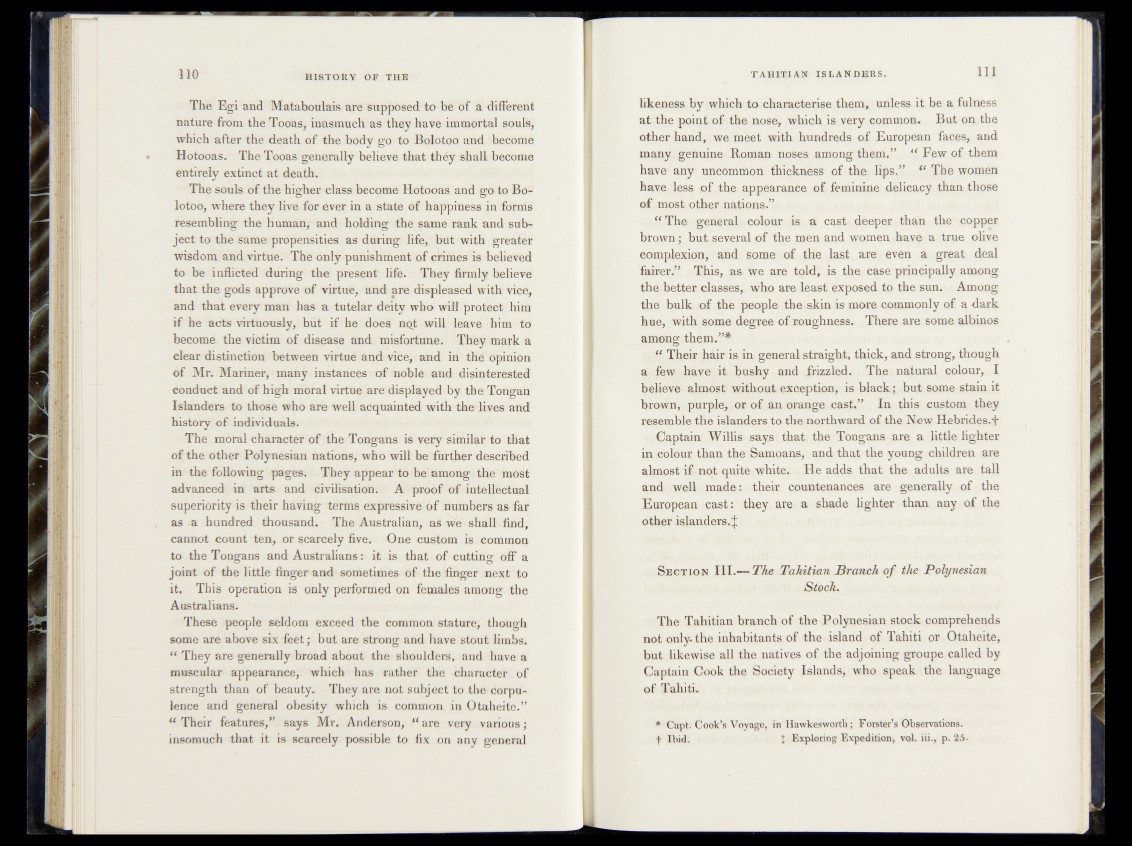
The Egi and Mataboulais are supposed to be of a different
nature from the Tooas, inasmuch as they have immortal souls,
which after the death of the body go to Bolotoo and become
Hotooas. The Tooas generally believe that they shall become
entirely extinct at death.
The souls of the higher class become Hotooas and go to Bolotoo,
where they live for ever in a state of happiness in forms
resembling the human, and holding the same rank and subject
to the same propensities as during life, but with greater
wisdomland virtue. The only punishment of crimes is believed
to be inflicted during the present life. They firmly believe
that the gods approve of virtue, and are displeased with vice,
and that every man has a tutelar deity who will protect him
if he acts virtuously, but if he does nqt will leave him to
become the victim of disease and misfortune. They mark a
clear distinction between virtue and vice, and in the opinion
of Mr. Mariner, many instances ~of noble and disinterested!
conduct and of high moral virtue are displayed by theTongan
Islanders to those who are well acquainted with the lives and
history of individuals.
The moral character of the Tongans is very similar to that
of the other Polynesian nations, who will be further described
in the following pages. They appear to be among the most
advanced in arts and civilisation. A proof of intellectual
superiority is their having terms expressive of numbers as far
as a hundred thousand. The Australian, as we shall find,
cannot count ten, or scarcely five. One custom is common
to the Tongans and Australians: it is that of cutting: off a
joint of the little finger and sometimes of the finger next to
it. This operation is only performed on females among the
Australians.
These people seldom exceed the common stature, though
some are above six feet; but are strong and have stout limbs.
“ They are generally broad about the shoulders, and have a
muscular appearance, which has rather the character of
strength than of beauty. They are not subject to the corpulence
and general obesity which is common in Otaheite.”
u Their features,” says Mr, Anderson, u are very various;
insomuch that it is scarcely possible to fix on any general
likeness by which to characterise them, unless it be a fulness
at the point of the. nose, which is very common. But on the
other hand,, we meet with hundreds of European faces, and
many genuine Roman noses, among them.” “ Few of them
have any uncommon thickness of the lips/’ . “ The women
have less of the appearance of feminine delicacy than those
of most other ;nationa^E|
if The general colour is a cast deeper than the copper
bro.wn; but several of the men and women have a true olive
complexion, and some of the last are even a great deal
fairer.” This, as. we are told, is the ease principally among
the better classes, who are least exposed to the sun. Among
the bulk of the people the skin is more commonly of a dark
hue, with some degree of roughness. There are some albinos
among them.”*
“ Their hair is in general straight, thick, and strong, though
a few have it bushy and frizzled. The natural colour, I
believe almost without exception, is black; but some stain it
brown, purple, or of an orange cast.” In this custom they
resemble the islanders to the northward of the New Hebrides.!-
Captain Willis says that the Tongans are a little lighter
in colour than the Samoans, and that the young children are
almost if-not quite white. He adds that the adults are tall
and well made: their countenances ace generally of the
European cast: they are a shade fighter than any of the
other islanders. J |
Section III.—— The Tahitian Branch o f the Polynesian
Stock.
The Tahitian branch of the Polynesian stock comprehends
not only, the inhabitants of the island of Tahiti or Otaheite,
but likewise all the natives of the adjoining groupe called by
Captain Cook the Society Islands, who speak the language
of Tahiti.
* Capt. Cook’s Voyage, in Hawkesworth; Forster’s Observations,
-f- Ibid. :i i ; J Exploring Expedition, vol. iii., p. 25-